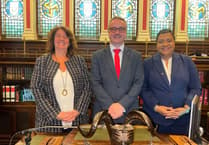There needs to be a ’just transition’ to ensure that the move to cut carbon emissions does not contribute to poverty and inequality.
Questions on the Council of Ministers’ climate change plans to ban the replacement of fossil fuel heating systems were tabled in Tynwald by former minister Chris Thomas.
The government’s draft Climate Change Bill, which is currently under public consultation, will provide the legal framework to meet a planned target for the island to have net zero emissions by 2050.
The Bill identifies three stages for the reduction of emissions from fossil fuel heating.
Stage 1 is a ban on the installation of gas or oil heating systems in new buildings from January 1 2025.
The second stage allows the Council of Ministers to ban the installation of replacement fossil fuel powered heating systems in existing premises at a date to be determined in the future, subject to a consultation and Tynwald approval.
And stage three creates powers to restrict the use, sale and importation of fossil fuels in the island, again subject to a consultation and Tynwald approval.
In his written reply to Mr Thomas, Chief Minister Howard Quayle said the decision over when to implement either a full or a partial future ban on replacement fossil fuel heating systems in existing properties will be subject to further research, public consultation, and the approval of secondary legislation in Tynwald.
’This is necessary to ensure a smooth and just transition enabled by adequate capacity through training within the trade sector,’ he said.
Mr Quayle explained the principle of a just transition involved taking action to reduce net Isle of Man emissions of greenhouse gases in a way that is fair and does not add economic inequality.
This includes supporting environmentally and socially sustainable jobs, supporting low-carbon investment and infrastructure, and engaging with workers, trade unions, communities, non-government organisations, business and industry.
He said moves to a net carbon zero must be done in a way that does not negatively affect the current workforce and overall economy but that contributes to ’resource-efficient and sustainable economic approaches which help to address inequality and poverty’.
The draft Bill also proposes amendments to the Electricity Act 1996 that would permit renewable energy projects such as community generation.
A prior information notice seeking individuals or organisations who could construct onshore renewable energy facilities was issued by the climate change transformation board last week.



.jpeg?width=209&height=140&crop=209:145,smart&quality=75)

This article has no comments yet. Be the first to leave a comment.